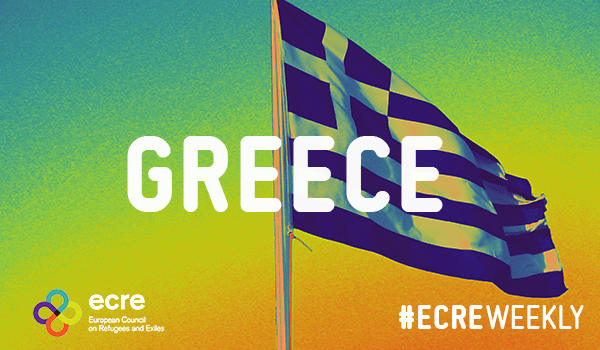As of 21 September more than 9,000 people from the destroyed Moria camp had been transferred to the new tented camp close to Kara Tepe. Conditions in the improvised camp guarded by hundreds of police officers remain critical, movements in and out of the camp are restricted, and a total of 243 coronavirus cases have been detected in the facility.
The temporary camp in Kara Tepe located on archaeological sites and old army grounds, now hosting more than 9,000 people lacks stable electricity, sanitary facilities, sufficient food delivery and space for social distancing. The number of positive COVID-19 cases has reached 243 with 7,064 rapid tests conducted in the temporary facility offering less than basic quarantine areas. According to Citizen Protection Minister Michalis Chrysochoidis, 350 police officers were stationed by 21 September and the number is set to doubled up in the near future, while movement in and out of the camp is severely restricted and requires time-consuming registration. The European Court of Human Rights granted interim measures on 24 September, ordering Greece to safeguard the life and limb of two vulnerable asylum seekers hosted in the camp.
The closure by 31 December of the former reception centre in Kara Tepe run by the local municipality and hosting 970 vulnerable people, along with the closure of the PIKPA centre hosting 100 people by 31 October, has been announced by Minister of Migration and Asylum Notis Mitarakis. The European Commission confirmed on 17 September that it will finance and co-manage a “modern” refugee camp to replace Moria.
In a press release issued on 24 September the UN Refugee Agency UNHCR, is calling for urgent action to improve conditions and ensure humane solutions for asylum seekers in reception centres in the Aegean islands, including in the new emergency site on Lesvos. “What is crucial is comprehensive response, going beyond short-term fixes. This means ensuring adequate reception conditions, access to fair and fast asylum procedures, integration opportunities for those granted asylum and swift returns for those not in need of international protection. Unless all elements of the response are adequately and promptly addressed, we will see more Morias emerging,” said UNHCR Representative in Greece, Philippe Leclerc.
Following another fire on 21 September in the Reception and Identification Centre in Vathi, Samos currently under quarantine after a COVID-19 outbreak, three housing containers were burned and 56 unaccompanied children were transferred to a hotel outside of the facility. On 24 September, 59 of the 113 unaccompanied children on Samos were transferred to the mainland. The centre in Samos lacks quarantine infrastructure and has only one doctor forcing people to sleep outside his office to get an appointment.
According to Greek authorities the relocation of recognized refugees from the Greek islands to EU member states is being prepared in cooperation with the European Commission that released its European Pact on Migration and Asylum on 23 September. Further, Greek authorities note that the use of hotels and accommodation facilities on the mainland, under reduction and set to be terminated in 2020, will be used for this specific purpose for a period of a few weeks.
For further information:
- ECRE, Greece: Transfers to Improvised Tent Camp has Begun, Thousands Sleeping Rough, EU to Co-manage New Reception Structure in Lesbos, September 2020
- Greek Council for Refugees (GCR), Solidarity Now and others: Joint statement of 48 NGOs regarding the fire at the Registration and Identification Centre at Moria, September 2020
- ECRE, Greece: Moria Fire – Thousands Sleeping Rough, Chaos Prevails, Calls for Structural Solutions, September 2020
- ECRE, Greece: 10,000 People Prevented Access, Lockdown Extended, Recognition Rate Increases, September 2020
- ECRE, Greece: Border Fence Extension, Denial of Push-backs, Anti-migrant Violence, Continued Destitution, Drop in Protection Rate, August 2020
- ECRE, Greece: No Accountability for Deadly Shooting, Continued Push-backs and Evictions, Critique of Crack-down on NGOs, German States Willing to Relocate, July 2020
- ECRE, Greece: Camp Lockdown Extended, Children in Detention, Cuts in Housing, Red-tape on NGOs and Continued Push-backs, June 2020
- AIDA, 2019 Update Greece, June 2020
- ECRE, Greece: Pushbacks Continue, Eviction of Makeshift Camp in Athens, June 2020
- ECRE, Greece: 500 to Escape Greece – Thousands Facing Destitution, Detention and Push-backs, June 2020
- AIDA, Housing out of reach, May 2019
- ECRE, Greece: France to Relocate 750 People, Government Deny Responsibility for Deadly Border Shooting, Lock-down Extended, and Violations Continue, May 2020
- ECRE, Greece: Chaotic Resumption of Procedures, Hundreds of Children Detained, Crack-Down on NGOs, New Evidence of Push-backs to Turkey, May 2020
- ECRE, Greece: New Relocations the only Positive Development amid Continued Violations, May 2020
- ECRE, Greece: Deadly Shot Fired from Greece, Continued Push-backs, Transfers to Mainland Met with Attacks, Parliament Votes on New Controversial Bill, May 2020
- ECRE, Greece: Fires in Samos Camp, Evacuations on Hold, European Cities Offer Relocation, April 2020
- ECRE, Greece: Unrest Amid Intensifying Corona Threat, ECtHR Orders Measures for Vulnerable Groups, April 2020
- ECRE, Greece: 1000 Vulnerable People Evacuated, Relocation of Children Started, Asylum Procedures Suspended, Renewed Tensions at Turkish Border, April 2020
- ECRE, Greece: Still no Access to Asylum, Second Camp Quarantined, First Relocations Ahead, Push Backs to Turkey, April 2020
- ECRE, Greece: Parliament Ratifies Emergency Decree Amid Intensifying Critique, March 2020
- ECRE, Greece: Fire and Virus Fear in Moria, 450 People Detained on Vessel Moved to Closed Camp, March 2020
- ECRE, Violations Continue in Greece, EU Says Asylum Procedures Cannot be Suspended, March 2020
- Organisations in Greece, Joint Statement: “Protect our laws and humanity!”, March 2020
- ECRE, Weekly Editorial: EU is Crossing the Red Line by Preventing Refugees from Crossing its Borders, March 2020
Photo: ECRE
This article appeared in the ECRE Weekly Bulletin . You can subscribe to the Weekly Bulletin here.

